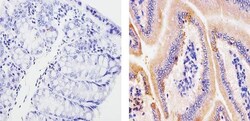Learn More
CCL4 Recombinant Polyclonal Antibody (6HCLC), Invitrogen™
Rabbit Recombinant Polyclonal Antibody
Marca: Invitrogen 710391
Descripción
This antibody is predicted to react with bovine, canine, non-human primate and porcine based on sequence homology. Recombinant rabbit polyclonal antibodies are unique offerings from Thermo Fisher Scientific. They are comprised of a selection of multiple different recombinant monoclonal antibodies, providing the best of both worlds - the sensitivity of polyclonal antibodies with the specificity of monoclonal antibodies - all delivered with the consistency only found in a recombinant antibody. While functionally the same as a polyclonal antibody - recognizing multiple epitope sites on the target and producing higher detection sensitivity for low abundance targets - a recombinant rabbit polyclonal antibody has a known mixture of light and heavy chains. The exact population can be produced in every lot, circumventing the biological variability typically associated with polyclonal antibody production.
CCL4 (macrophage inflammatory protein 1-beta, MIP1B) belongs to the intercrine beta (chemokine CC) family. Functionally, CCL4 is involved in chemotactic and proinflammatory effects, and homeostasis. CCL4 is produced by macrophages upon stimulation by bacterial endotoxins. CCL4 recruits and stimulates various inflammatory cells at sites of inflammation. CCL4 is produced by lymphocytes, macrophages and dendritic cells. Both CCL4 and the related protein CCL3 participate in the host response to invading bacterial, viral, parasite and fungal pathogens by regulating the trafficking and activation state of selected subgroups of inflammatory cells. While both CCL4 and CCL3 exert similar effects on monocytes, their effect on lymphocytes differ, with CCL4 selectively attracting CD4+ lymphocytes and CCL3 selectively attracting CD8+ lymphocytes. Additionally, both have been shown to be potent chemoattractants for B cells, eosinophils and dendritic cells. The processed form of CCL4 can induce down-modulation of surface expression of the chemokine receptor CCR5, thus inhibiting the CCR5-mediated entry of HIV-1 in T cells. CCL4 binds with high affinity to CCR5 receptors.
Especificaciones
| CCL4 | |
| Recombinant Polyclonal | |
| 0.5 mg/mL | |
| PBS with 0.09% sodium azide | |
| P13236, P14097 | |
| CCL4 | |
| Recombinant protein corresponding to amino acids 1–92 of human MIP-1 beta | |
| 100 μg | |
| Primary | |
| Human, Mouse | |
| Antibody | |
| IgG |
| Immunohistochemistry (Paraffin), Western Blot | |
| 6HCLC | |
| Unconjugated | |
| CCL4 | |
| ACT2; ACT-2; AT744.1; CC chemokine ligand 4; C-C motif chemokine 4; C-C motif chemokine ligand 4; Ccl4; chemokine (C-C motif) ligand 4; G-26; G-26 T-lymphocyte-secreted protein; HC21; immune activation gene 2; immune activation gene-2; immune activation protein 2; LAG1; LAG-1; Lymphocyte activation gene 1 protein; macrophage inflammatory protein 1-beta; macrophage inflammatory protein-1 beta; MGC104418; MGC126025; MGC126026; MIP-1 beta; MIP1b; MIP-1B; Mip1-b; MIP1B1; MIP1beta; MIP-1BETA; MIP-1-beta; MIP1-beta; MIP-1-beta(1-69); MIP-1-beta(3-69); PAT 744; Protein H400; putative MIP-1beta protein; RP23-320E6.8; SCY4A; SCYA2; Scya4; secreted protein G-26; SIS-gamma; small inducible cytokine A4; small inducible cytokine A4 (homologous to mouse Mip-1b); small-inducible cytokine A4; T-cell activation protein 2 | |
| Rabbit | |
| Protein A | |
| RUO | |
| 20303, 6351 | |
| Store at 4°C short term. For long term storage, store at -20°C, avoiding freeze/thaw cycles. | |
| Liquid |
Proporcione sus comentarios sobre el contenido del producto rellenando el siguiente formulario.









